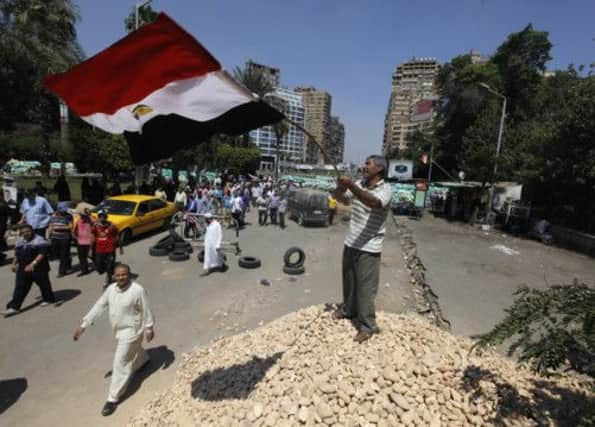Morsi sit-in protesters warned they face siege


The move would be a step toward clearing areas that loyalists say they will defend until their leader is returned to power.
A security cordon around the two Cairo sit-in sites raises the possibility of more violence in Egypt, a month after a military coup backed by popular support overthrew Mr Morsi.
Advertisement
Hide AdAdvertisement
Hide AdProtesters armed with sticks and makeshift body armour stand guard behind walls of sandbags, tyres and bricks.
The state TV broadcast said a cordon of security forces and vehicles would surround the sites within 48 hours.
The report said authorities would let people leave without officials inspecting their identities or arresting them. However, security forces would not allow anyone else into the protests.
On Thursday, the government offered protection and “safe passage” to those willing to leave the protest camp, as it announced it was taking “measures” to end the protests. It made its pledge a day after the military-backed government gave orders to police to end what it described as “a threat to national security” and sources of “citizens’ terrorism”.
Rights groups warn against ending the protests by force. Most recently, Human Rights Watch called on Egypt’s interim leadership to take all measures to avert bloodshed.
“To avoid another bloodbath, Egypt’s civilian rulers need to ensure the ongoing right of protesters to assemble peacefully, and seek alternatives to a forcible dispersal of the crowds,” said Nadim Houry, deputy director of the Middle East and North Africa division of Human Rights Watch.
The month since the coup has seen more than 130 Muslim Brotherhood supporters killed and hundreds injured in confrontations near the main sit-in outside Rabaah el-Adawiya mosque in eastern Cairo.
Egypt’s military deposed Mr Morsi on 3 July, following days of demonstrations by millions who rallied against him and the rule of his Muslim Brotherhood.
Advertisement
Hide AdAdvertisement
Hide AdThose protesting at the time said Mr Morsi’s one-year rule was rampant with political failures and focused on concentrating power in the hands of his Islamist group.
Mr Morsi’s group has opposed all measures taken by the military since the coup, including the appointment of an interim president, the suspension of the constitution and the disbanding of the Islamist-dominated legislative council.
The group vowed to continue its street pressure until Mr Morsi is reinstated, who remains held by the military
In remarks that signalled USsupport of the military, secretary of state of John Kerry said he considered the military’s move against Mr Morsi as “restoring democracy” to Egypt.
A spokesman of the Muslim Brotherhood, Gehad el-Haddad, denounced Mr Kerry’s remarks in a statement yesteray.
“Does Secretary Kerry accept defence secretary [Chuck] Hagel to step in and remove [president Barack] Obama if large protests take place in America?” Mr el-Haddad asked. Meanwhile, army chief Abdel Fattah al-Sisi understands there must be a political solution to Egypt’s crisis, vice-president Mohamed ElBaradei said in an interview published on Friday.
He added that the general was not thinking of running for president.
“He understands that there has to be a political solution, but he has a responsibility to protect the country in terms of security. And the army is on the edge,” Mr ElBaradei is reported as saying.